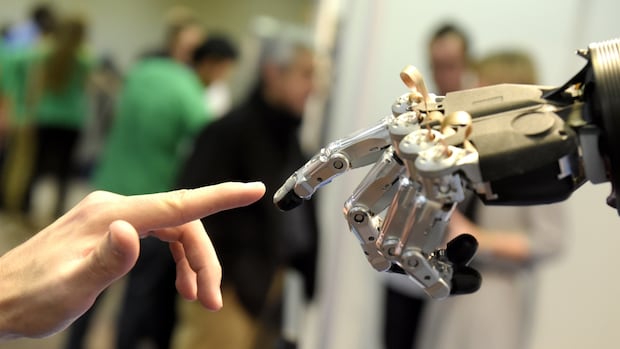As It Happens5:35Dance Your PhD winner channels his inner Kylie Minogue to explain food science
After Sulo Roukka finished defending his PhD in “the usual way,” he didn’t quite know what to do with himself. So he dressed up like a chili pepper and made a dance video about it.
The University of Helsinki food scientist is this year’s winner of Science magazine’s annual Dance Your PhD contest, which has academics ditch their lab coats for latex to explain their complex dissertations with movement and song.
“After the PhD defence, I felt a bit empty. And then this idea got in my mind, like, let’s do this,” Roukka told As It Happens host Nil Köksal.
“I believe that it’s an interesting combination of science meets the dance.”
WATCH | This year’s winning Dance Your PhD entry:
Roukka’s PhD is called “Insights into oral chemesthetic perception: A focus on food-related behaviour.” In laymen’s terms, he studies how different people react to the chemical compounds that make food feel hot, cool or acidic.
“I’m curious about how we perceive and experience food through our senses,” he said.
In his video, Roukka spits lyrics about what makes things “hot hot hot” and “cool cool cool” as dancers in lab coats groove out in a laboratory filled with chili peppers and mint leaves.
Later, the dancers, all from the student theatre group Viikki-Speksi, remove their labcoats to reveal sparkling disco outfits, while Roukka sports a hot red unitard courtesy of his friend and stylist Teemu Muurimäki
“He made me look like red chilli pepper and I totally felt like Kylie Minogue in the Padam Padam video,” Roukka said.
Asked whether he’s a fan of the Australian pop star, Roukka replied: “Yes, of course. Like, who isn’t?”
Roukka won the overall prize, as well as in the chemistry category, earning a $2,750 US ($3,804 Cdn) prize.
Priya Reddy from Friedrich Schiller University Jena in Germany, won in the biology category for her video that uses theatric, interpretive dance to explain plant vaccination.
Arfor Houwman of the University of Innsbruck in Austria took home the physics prize for his space-infused electronic music video about laser cooling.
And Manisha Biswas of Humboldt University of Berlin won the social sciences category for her video that uses synchronized movement to explore the evolutionary and cultural advantages of, well, synchronized movement.
WATCH | Dance Your PhD category winners:
John Bohannon, a former Science correspondent-turned-data scientist who started the contest in 2008 and continues to oversee it, noted this year’s competitors skewed more European than previous years.
“This year, American scientists did not seem to be in the mood to dance,” he said in a press release. “Lucky for the world, Europe’s scientists have doubled their creativity and enthusiasm.”
‘Bring peace to the dinner table’
Roukka says he was thrilled to have an opportunity to share his research, which he says has implications outside the food lab. In his thesis, he found that chemical compounds in food don’t affect everyone the same way.
“People are different, and there are individual differences. And I think these kind of individual differences in sensitivity can explain our food experiences,” he said.
“We need to understand our individual differences to get a better understanding of each other. And I believe by doing so we can bring peace to the dinner table, and beyond.”






